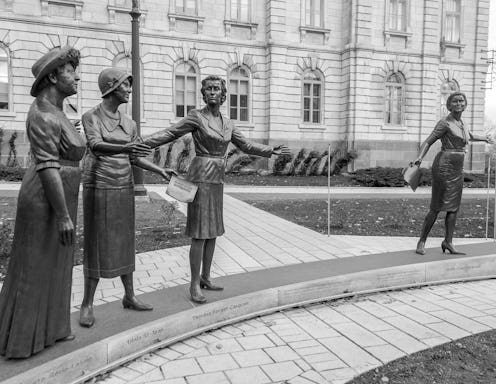
With so many people claiming that feminism is no longer necessary, it's helpful to remind ourselves that women have achieved some very basic rights only recently, and still have yet to achieve many others. If your knowledge of history is fuzzy, OffBeat's "Guess What Women Couldn't Do in 1960?" quiz will tell you which privileges were denied to women for a remarkably long time. Through 16 questions, the quiz reveals that our grandmas and even our moms didn't have many of the opportunities which we take for granted — and it reminds us that some rights, like paid maternity leave, are still not ours.
If you'd like to test your own knowledge of the women's movement and its results, then don't read on yet. I'm about to reveal some of the answers. Instead, head on over to OffBeat to take the quiz yourself. Even if you pride yourself on being a history buff, you might be surprised. I write and think about women's issues every day, and I still got a few wrong.
Okay, are you ready to learn some depressing facts about life in the United States in 1960? Read on.
1. Women Could Not Have Abortions Throughout The United States Until 1973
In January of 1973 — little more than 40 years ago — Roe v. Wade declared laws prohibiting abortion unconstitutional, making the procedure legal throughout the United States. Before that, abortion was only allowed in 20 states, most of which significantly limited the circumstances under which it could be performed ― though underground groups like Jane worked to provide safe abortions.
2. Married Women Could Not Own Credit Cards Under Their Own Names Until 1974
Just ask Hilary Clinton. A bank denied her a credit card and told her to use her husband's even after the 1974 passage of the Equal Credit Opportunity Act, which was supposed to prohibit credit discrimination on the basis of gender. Before its passage, many banks granted credit cards to women only with their husbands' signatures, and outright refused to issue them to unmarried women.
3. Women Could Not Attend Most Ivy League Schools Until The '70s
Cornell is the one exception, voting to start admitting women in 1872. The rest of the Ivies didn't go co-ed for another century. Princeton and Yale began admitting women as undergraduates in 1969, Columbia welcomed its first co-ed class 1983, and the rest did it during the '70s.
4. Women Could Not Box In The Olympics Until 2012
The first women's Olympic boxing match took place during the 2012 Summer Olympics in London, and was won by British athlete Nicola Adams. Adams was not only the first woman but also the first LBGT athlete to win an Olympic gold medal for boxing.
5. Married Women Could Not Use Contraceptives In Every State Until 1965
Prior to the Griswold v. Connecticut decision in 1965, doctors legally denied married women prescriptions for birth control. And on the topic of family planning, here's another mind-blowing fact: Until 1972, only married women could be prescribed birth control.
6. Women Could Not Complain About Workplace Harassment
Workplace harassment was not considered a legal offense until 1977, when a court ruled in favor of a woman who was fired for refusing her boss's sexual advances. The court stated that her termination violated the 1974 Civil Rights Act, which made employment discrimination illegal. But the government did not hold employers financially liable for sexual harassment until 1998, following two Supreme Court decisions.
The fact that we can do all these things now — and the fact that we still cannot do many things, like walk alone as safely as men or make as much money for the same work — is evidence both that we need feminism and that we owe many positive things to it.
Images: Paul VanDerWerf/Flickr; OffBeat (6)